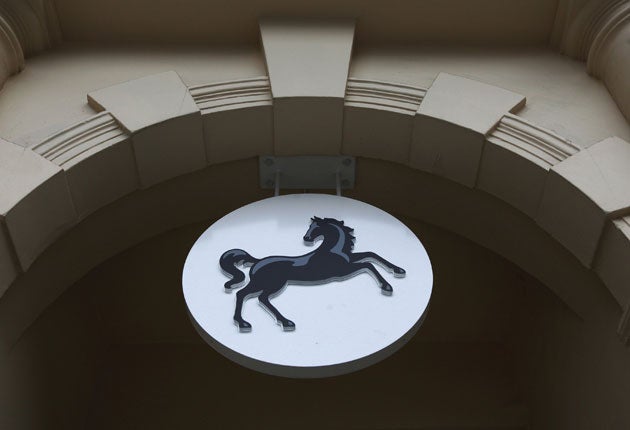Hopes of pay-back time for taxpayers as Lloyds shares pass break-even price
Chancellor may soon start to recoup £20bn spent rescuing lender

Lloyds Banking Group shares were today trading above the Government's break-even price, fuelling speculation that taxpayers will soon start to recoup the more than £20 billion spent rescuing the lender.
Shares in the 39-per-cent-state-owned bank today rose above the 61.2p level at which the Government said it would break even on its 2008 bailout, and are now at their highest point for two years.
The Treasury is widely expected to begin selling its stakes in Lloyds and 81 per cent nationalised Royal Bank of Scotland before the 2015 general election. Prime Minister David Cameron recently raised the prospect of selling RBS shares at a loss.
Shares in Lloyds have more than doubled over the past year, boosted by state stimulus for the banking sector, the recovering economy and housing market, and its improving balance sheet.
Lloyds chief executive Antonio Horta-Osorio yesterday told shareholders at its annual meeting: "We expect us to return to profitability this year and to grow our core business, to realise our full potential to deliver strong, stable and sustainable returns for you, the shareholders, and to allow UK taxpayers' investment in the group to be repaid."
Mr Horta-Osorio's £1.5 million shares bonus for 2012 is tied to the 61p break-even level. It will vest after five years if the state has sold at least a third of its stake at prices above 61p, or if a share price of 73.6p has been reached.
However, the 61p price has been described as "contrived" by banking analyst Ian Gordon at Investec Securities, who argues it "conveniently ignores its average in-price of 73.6p".
The state ploughed more than £20 billion into Lloyds at the height of the credit crunch after the then Labour government brokered its rescue of Halifax Bank of Scotland.
Lloyds remained in the red in 2012 with pre-tax losses of £570 million after setting aside £3.6 billion to compensate customers who were mis-sold payment protection insurance (PPI).
But its first quarter underlying profits surged to £1.5 billion, with bad debts plunging by 40 per cent.
Lloyds chairman Sir Win Bischoff recently announced he is standing down and hailed "significant progress" in the bank's recovery.
UK Financial Investments, which manages the state's bank holdings, declined to comment.
Lloyds’ share price has more than doubled in the past 12 months as the prospects for the bank have brightened. But analysts predicted it will need to stay above the 62p level for a longer period before the government decides to act.
Mike van Dulken, the head of research at Accendo Markets, said: “The big question now is to what extent the Government makes the most of existing momentum and leaves the shares run to try to profit from the situation. It’s a big trade-off between returning the shares to the markets as quickly as possible (well before the 2015 election), and taking the opportunity to make up for some of the costs taxpayers incurred via forced bailouts.”
Fellow state owned bank RBS also advanced today, and added 6.8p to 325.6p, but it is still below the average price paid by government of 502p.
PA
Subscribe to Independent Premium to bookmark this article
Want to bookmark your favourite articles and stories to read or reference later? Start your Independent Premium subscription today.

Join our commenting forum
Join thought-provoking conversations, follow other Independent readers and see their replies